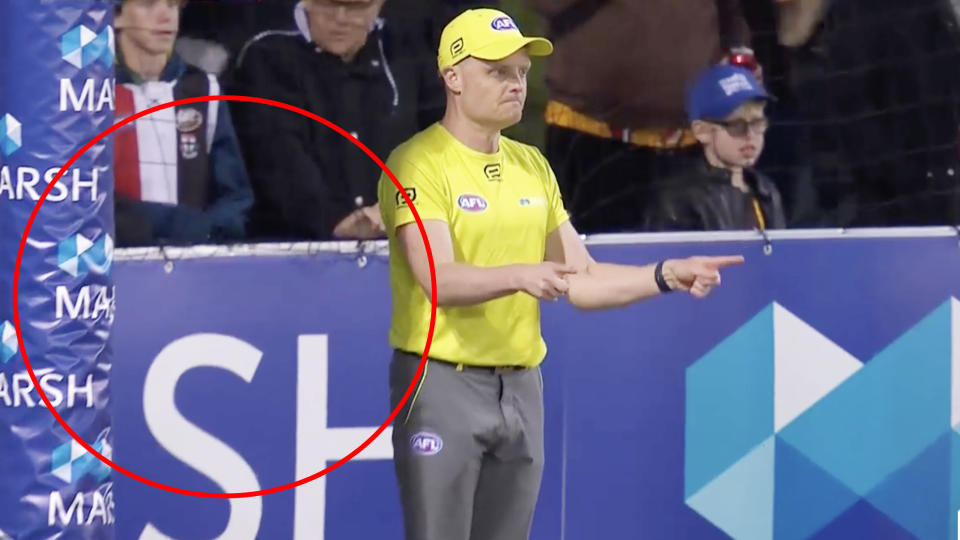26-year-first for AFL goal umpires heads 2020 rule changes
At the beginning of every AFL season, headlines and comments sections are often dominated by one thing - which rules the league has changed.
In a bid to increase scoring, 2019 saw the AFL introduce a raft of major rules changes.
‘UNEDUCATED, GOOSE’: Radio hosts in ugly on-air spat over women's footy
DEVELOPMENT: Researchers make 'scary' discovery in late AFL legend's brain
Most notable among these was the new ‘6-6-6’ alignment for centre bounces, as well as players being allowed to immediately play on after a behind was scored.
While some teams thrived under the new rules, scoring across the league dipped - much to the dismay of fans.
In previous seasons, this would have been cause for concern from AFL House. Instead, it’s been an unusually quiet summer for the AFL rules committee.
That’s because, by and large, what umpires blow their whistles for on the ground will stay the same in 2020 as it was in 2019.
Despite that, there have been a suite of smaller changes to goal umpiring, the Match Review Officer and the Tribunal which could all have an impact this season.
Big change in how goal umpires signal scores
Perhaps the most visually noticeable change for 2020 will be the way goal umpires signal a goal.
Since 1994, goal umpires have been compelled to move to the centre of the goalposts to give the iconic signal for a major score.
This will no longer be the case in 2020, with officials now able to signal a score from any position on the goal line.

First seen in the Marsh Community Series of pre-season games, the goal umpiring change was not actually implemented in the AFLW season.
The move sees the AFL hark back to its VFL origins, in which umpires could signal a score from anywhere on the goal line.
Tribunal review leads to several key moves for 2020
Following the 2019 season, the AFL conducted a review of the tribunal process, announcing eight key changes back in December.
Most of the changes concentrated on making the Match Review Officer and Tribunal themselves slightly more efficient, allowing them to report back to the public sooner than previously.
The grading and application of certain charges has also been tinkered with.
Verdicts from the Match Review Officer will be delivered 24 hours after every game has been played
The tribunal chair will provide a verbal explanation for all tribunal decisions, in an effort to help alleviate some of the confusion that arose from certain applications of the rules
Intentional off-ball strikes will be classified one grade higher in 2020
Toby Greene on entry to Mike Sheahan media centre at Docklands, which doubles as the AFL tribunal hearing room: “Oh, this is my room ... I wasn’t happy when I was in here last time.” pic.twitter.com/Zj5t0F4Eq7
— Shayne Hope 📰 (@shayne_hope) February 27, 2020
Tripping can now be penalised financially, meaning lower-grade tripping offences (negligible impact) will no longer result in a suspension
A stricter adjudication of melee rules will apply to the third player and onwards to escalate any on-field conflict, particularly during quarter and half time breaks
Stricter guidelines for referring repeat offenders directly to the Tribunal
Challenges to financial sanctions will now be adjudicated by a single legally trained jury member, and can only be submitted in writing
Other proposed 2020 changes shelved, for now
Two notable proposals from the AFL which became talking points over the off-season have been sidelined for the time being.
The first, shortening the half time break from 20 minutes down to 10, was proposed to help retain TV audiences who switched off during the lengthy half-time break.
Despite being generally well received by players, the change was met opposition from certain sections - notably Hawthorn president Jeff Kennett.
Kennett also pushed back against the other major thought bubble for the 2020 season, allowing a ‘captain’s challenge’ to contentious goal umpiring decisions.


